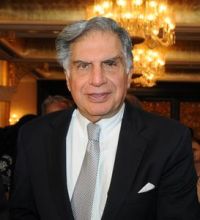Ratan Tata
Ratan Naval Tata (born December 28, 1937) is a renowned Indian industrialist and philanthropist, best known for transforming the Tata Group into a global conglomerate. As former chairman of Tata Sons and Tata Group, he led historic acquisitions such as Jaguar Land Rover and Corus, while championing ethical leadership and nation-building through philanthropy.[1]
Early Life and Education
Born in Mumbai, Ratan Tata is the great-grandson of Tata Group founder Jamsetji Tata. Raised by his grandmother Lady Navajbai Tata after his parents' separation, Ratan studied architecture and engineering at Cornell University, followed by the Advanced Management Program at Harvard Business School. He began his career on the shop floor at Tata Steel, learning operations hands-on.[2]
Rise to Leadership
Ratan Tata took over as Chairman of Tata Group in 1991, initiating a strategic transformation. He unified the group's diverse businesses, emphasized brand synergy, and refocused efforts on core sectors including automobiles, steel, software, and consumer goods. [3]
Key Achievements
- Global Acquisitions: Led Tata Tea’s acquisition of Tetley, Tata Motors’ purchase of Jaguar Land Rover, and Tata Steel’s acquisition of Corus.
- Tata Nano: Launched the world’s cheapest car in 2008, demonstrating innovation in affordable mobility.
- Value-Centric Leadership: Upheld Tata’s commitment to ethics, employee welfare, and community service. [4]
Philanthropy and Social Impact
Nearly two-thirds of Tata Sons' equity is held by charitable trusts, supporting causes in education, healthcare, rural development, and arts. Personally, Ratan Tata has supported cancer research, academic institutions like Harvard and Cornell, and entrepreneurship initiatives across India.
Awards and Recognition
- Padma Bhushan (2000)
- Padma Vibhushan (2008)
- Honorary Knight Grand Cross of the British Empire (KBE)
- Named among TIME's most influential people (2008)
Post-Retirement and Legacy
After retiring in 2012, Ratan Tata continued to serve as Chairman Emeritus. He has actively invested in startups like Ola, Paytm, and Urban Ladder, and remains a guiding figure in Indian entrepreneurship. His crisis leadership during the 26/11 Mumbai attacks, particularly for the Taj Hotel, earned national admiration.
Personal Life
Ratan Tata is known for his private lifestyle and philanthropic ethos. He has never married and often shares insights on leadership, innovation, and integrity through public speeches and social media.
Legacy
Ratan Tata is widely celebrated as one of India's greatest business leaders. His visionary leadership not only elevated Tata Group to global prominence but also reinforced the role of ethical capitalism in India's development.[5]


